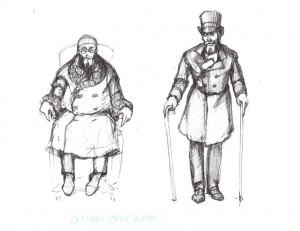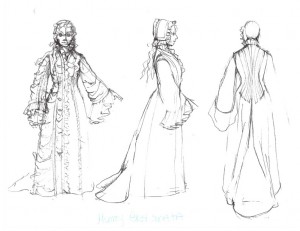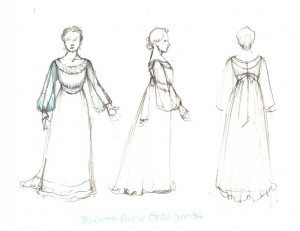Press play to watch an introduction by director
Rob Melrose

SCENE ONE
As the play opens, an eighty-year-old man in a wheelchair named Hummel overhears a thirsty Student named Arkenholz asking what appears to be thin air for a drink. The Student is actually speaking to the ghost of a Milkmaid whom only he can see. The Student explains to the apparition that he is so disheveled because he had been saving the wounded from a collapsing building the night before. Upon overhearing the conversation, Hummel mentions that a newspaper article had mentioned the Student’s heroic actions, but that his name had not been mentioned. Meanwhile, the ghost of the Milkmaid seems to have disappeared.
Hummel realizes that he knew the Student’s father; it is revealed that both Arkenholz and Hummel blame each other for their financial woes. The Student remembers that his late father was bankrupt and constantly blamed Hummel for his impoverished state. However, according to Hummel, it was the Student’s father who spent money recklessly and then robbed Hummel of his life’s savings. After arguing over this point of contention, Hummel offers to make the Student prosperous and happy in return for doing Hummel a few favors.
The Student’s first task is to go to a production of the opera “The Valkyrie” that afternoon and to meet the Colonel and his daughter, referred to as the Girl, who live in a house that the Student has long admired. As they peer into the house’s windows, Hummel tells the Student about the people who live there. He first describes the statue of the Colonel’s wife who was beaten by her husband and now isolates herself at home, staring at the effigy of herself. Hummel then explains that because the Student was born on a Sunday, he can see things that are not necessarily occurring in the present moment, thus accounting for the Student’s ability to react to the accident the night before in such a timely manner and to see the Milkmaid. Hummel then returns to describing the beautiful house’s inhabitants and their tangled family tree.
Hummel tells the Student that he was once engaged to the white-haired woman who lives in the elegant house. The white-haired woman had a child with a man who is recently deceased — a daughter whom Hummel and the Student refer to as the woman in black. Perhaps the most haunting member of the household is the Mummy, a once stunning but now deranged recluse who worships the statue of herself that is visible through the window.
When the Student first catches sight of the Colonel’s daughter, the Girl, through one of the windows of the house, he is smitten. Hummel then asks the Student to become his son and heir to his fortune. The Student agrees just before he sees the ghost of the dead man walking outside the house. Hummel describes the dead man as “A kindly racketeer, who always looked forward to a beautiful funeral… When he felt the end approaching he bilked the government of 50,000 crowns.” Once again, Hummel is unable to sense this apparition.
Meanwhile, Hummel’s assistant, Johansson, returns from his errand. The Student takes him aside to learn more about his new boss, Hummel. Johansson paints a rather sinister picture of Hummel, describing him as manipulative, destructive, and dominating. Johansson mentions that there is only one thing that Hummel fears, and the Student surmises that it is the Milkmaid. The Student considers leaving Hummel, but when the Girl drops her bracelet and the Student is once again enraptured by her, he decides to go to “The Valkyrie” as Hummel wishes in order to meet the Girl.
Hummel, surrounded by a group of beggars, calls on those assembled to hail and applaud the Student for his valiance the night before. Suddenly, Hummel collapses when the Milkmaid reappears, visible only to Hummel and the Student. Terrified, he commands that Johansson get him away as fast as possible.

SCENE TWO
Inside the house, Bengtsson, the butler, explains the ghostly family’s unsettling quirks to Johansson. Bengtsson reveals the chattering old woman who thinks she is a parrot hidden behind a secret door; she has disintegrated into a far cry from the statue that memorializes her youthful beauty. She persistently asks whether someone named Jacob is there. Bengtsson also informs Johansson that the Girl is disturbed. Johansson hopes that the Student will realize that this seemingly idyllic house is actually quite frightening. Unfortunately, the Student had already met and charmed both the Girl and the Colonel at the Opera.
SCENE THREE
Hummel shows up uninvited to dinner at the eerie house, demanding that Bengtsson bring the Colonel to see him and that Johansson leave him alone. While observing the statue of the woman, Hummel reveals that her name is Amalia and hears the old parrot-woman cackling behind the wall. Emerging from her hiding place, the decrepit Amaila creeps up behind Hummel and informs him that she is the same woman as the woman depicted in the statue, leaving Hummel very dismayed. Suddenly speaking normally, she again asks for Jacob, and Hummel tells her that his name is Jacob. Amalia explains perfectly coherently that she chooses to lives “mostly in the closet now, to keep from having to see or to be seen.” Hummel reveals that the Girl is actually his child and that he is angry at the Colonel for stealing his fiancée. When Hummel declares that he has come to the house to seek revenge on the Colonel and to make contact with his daughter, Amalia predicts that he will die in the very room in which they stand behind a Japanese screen if he does not spare the Colonel. Hummel wants his daughter, the Girl, to marry the Student, which is why he sent the Student to the opera. Amalia bemoans the hopeless sadness of her family’s situation, protesting that death would be a welcome escape, and exits.
The stern Colonel enters, inquiring as to whether Hummel was the one who bought all of his outstanding debts and now has control over the Colonel’s finances. Hummel confirms this suspicion, declaring that he now owns everything that was once the Colonel’s. He then proves that everything the Colonel is proud of is a sham, from his title of Colonel to his claim that he is from a noble family.
The dinner guests, including Hummel’s white-haired ex-fiancée, Miss Beate von Holsteinkrona, begin to arrive at the miserable Colonel’s home for the “ghost supper.” As Hummel addresses the guests, he draws attention to the fact that they are ignoring the fact that they know him. He also asserts that the Girl is his daughter, and that her suffering was instigated by the deplorable actions committed by the household. Amalia then angrily retorts that Hummel is in fact more despicable than the rest of them because of his penchant for revenge against such pitiable people. She calls Bengtsson forward, who recounts how Hummel once stole from another house for which he worked and murdered a girl – the ghost Milkmaid from the first scene – who had witnessed a crime he had committed. Disgraced, Hummel is reduced to Amalia’s parrotlike state. Amalia orders him to strangle himself in the next room behind the Japanese screen.

SCENE FOUR
In the Hyacinth Room of the house, the Student explains the qualities of hyacinths that he loves to the Girl – qualities that she shares. The Student wants to get engaged to the Girl, but she says that they must test each other. The Student sympathizes with her as she complains about her unhappy family. He offers to help her change her situation, but she insists that everything must stay the way it is. As she laments the menial chores she must complete, she wonders if life is worth living. The Student then describes a dinner party that his father once hosted, during which he alienated all of his guests and ended up in an insane asylum as a result. He confesses to the girl that, “If you keep quiet too long, stagnant water collects and things begin to rot, and that’s how it is in this house too. There is something rotting here. And I thought it was paradise…” In anguish, the Student wonders where the purer elements of life such as honor and beauty have gone. The Girl begins to die, and Bengtsson brings the Japanese screen to cover her. The Student sings as the Girl perishes, ending with the following advice: “wrathful deeds which you have done/ Cannot be cured with hate and strife;/
Comfort those you have distressed/ And with your goodness have you healed.”
